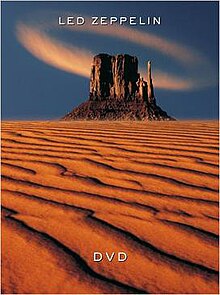Led Zeppelin DVD
| Led Zeppelin DVD | ||||
|---|---|---|---|---|
 |
||||
| Video by Led Zeppelin | ||||
| Released | 26 May 2003 | |||
| Recorded | 1969–1979 | |||
| Genre | Hard rock, heavy metal, blues rock, folk rock | |||
| Length | 320:00 | |||
| Label | Atlantic | |||
| Director | Dick Carruthers | |||
| Producer |
Jimmy Page Dick Carruthers |
|||
| Compiler | Jimmy Page | |||
| Led Zeppelin chronology | ||||
|
||||
| Professional ratings | |
|---|---|
| Review scores | |
| Source | Rating |
| Allmusic | |
| Uncut | |
| Rolling Stone | |
Led Zeppelin DVD is a double DVD set by the English rock band Led Zeppelin, released in the United Kingdom on 26 May 2003, and the United States on 27 May 2003. It contains live concert footage of the band spanning the years 1969 to 1979. The DVD includes performances from the Royal Albert Hall in 1970, Madison Square Garden in 1973, Earls Court in 1975, and Knebworth in 1979, plus other footage. Bootleg footage from some of the concerts is interspersed with the professionally shot material.
The DVD cover features West and East Mitten Buttes, photographed from the visitor centre at the Navajo Tribal Park located at Monument Valley, Arizona.
Led Zeppelin guitarist and producer of the DVD, Jimmy Page, commenced work on the project in the early 2000s. While fans had been trading poor quality versions of Led Zeppelin video material for years, this was the first official archival video release to contain any footage of the band playing live. In an interview he gave after the release of the DVD, Page explained the impetus behind the project:
The reason for [the DVD] was that there was no visual material [of the band] that was out there really. The studio albums had been put out in many different shapes and forms, but this was something that was sorely missing because [Led] Zeppelin built its material on live performances. So that had to be done.
The idea for a live chronology had, however, dated back some time before this, according to singer Robert Plant in 2003:
The idea of creating a Led Zeppelin collage has been in the works for ... fifteen years. We just didn't really have the time to put it together as a project because there was so much concentrated work that was required. So, as we all finished our individual projects, Jimmy Page took the helm along with some technical guys and this is what we've got.
...
Wikipedia
